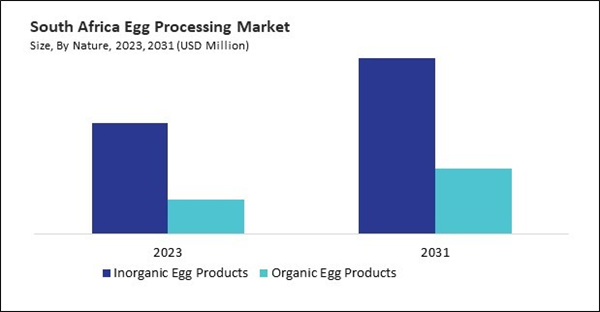Dried egg products represent a significant segment within the market, offering various advantages such as extended shelf life, ease of storage, and versatility in applications. These products are obtained through the dehydration of liquid eggs or egg yolks, resulting in powders or flakes that retain the nutritional properties of fresh eggs. Thus, the Brazil market would consume 114.82 kilo tonnes of Dried egg products by 2031.
The Brazil market dominated the LAMEA Egg Processing Market by Country in 2023, and would continue to be a dominant market till 2031; thereby, achieving a market value of $1,336.9 million by 2031. The Argentina market is showcasing a CAGR of 6.8% during (2024 - 2031). Additionally, The UAE market would register a CAGR of 5.9% during (2024 - 2031).
Trends in the market reflect evolving consumer preferences, technological advancements, and industry innovations. For example, consumers increasingly demand clean-label products made with natural, minimally processed ingredients. This trend has prompted egg processing companies to offer cleaner, more transparent product formulations free from artificial additives, preservatives, and allergens. Egg processing companies aim to meet consumer preferences for wholesome, nutritious, and trustworthy products by focusing on natural ingredients and transparent labeling.
Adopting digitalization and smart technologies is also revolutionizing the market, enhancing production processes' efficiency, traceability, and quality control. The companies invest in advanced automation, robotics, and data analytics systems to optimize production, improve product consistency, and ensure food safety. These smart technologies enable real-time monitoring, predictive maintenance, and quality assurance throughout the egg processing supply chain, leading to greater efficiency, transparency, and innovation in the market.
Furthermore, as the food retail industry in Saudi Arabia grows, there will likely be a higher demand for egg products from food manufacturers supplying products to retailers. As per the United States Department of Agriculture, in 2022, total food retail sales in Saudi Arabia were estimated at approximately $50 billion, and 50% was generated through modern retail channels and traditional grocery stores. Traditional grocery stores are declining due to the rapid expansion of new urban centers. Hence, the expansion of the region’s food retail industry is propelling the market’s growth.
Based on Nature, the market is segmented into Inorganic Egg Products, and Organic Egg Products. Based on Product, the market is segmented into Liquid Egg Products, Dried Egg Products, and Frozen Egg Products. Based on End-Use, the market is segmented into Food Processing & Manufacturing (Processed Foods & Ready Meals, Bakery & Confectionary, Dietary Supplements, Others), Food Service, and Retail. Based on countries, the market is segmented into Brazil, Argentina, UAE, Saudi Arabia, South Africa, Nigeria, and Rest of LAMEA.
List of Key Companies Profiled
- Rose Acre Farms, Inc.
- Interovo Egg Group BV
- Igreca SAS
- Wabash Valley Produce
- Rembrandt Enterprises, Inc.
- Avril Group
- Eurovo Srl
- Bouwhuis Enthoven BV
- Kewpie Corporation
- Taiyo International (Taiyo Kagaku Corporation)
Market Report Segmentation
By Nature (Volume, Kilo Tonnes, USD Billion, 2020-2031)- Inorganic Egg Products
- Organic Egg Products
- Liquid Egg Products
- Dried Egg Products
- Frozen Egg Products
- Food Processing & Manufacturing
- Processed Foods & Ready Meals
- Bakery & Confectionary
- Dietary Supplements
- Others
- Food Service
- Retail
- Brazil
- Argentina
- UAE
- Saudi Arabia
- South Africa
- Nigeria
- Rest of LAMEA
Table of Contents
Companies Mentioned
- Rose Acre Farms, Inc.
- Interovo Egg Group BV
- Igreca SAS
- Wabash Valley Produce
- Rembrandt Enterprises, Inc.
- Avril Group
- Eurovo Srl
- Bouwhuis Enthoven BV
- Kewpie Corporation
- Taiyo International (Taiyo Kagaku Corporation)









